“Deck the Halls” is a Christmas short story by American author Shirley Jackson which asks readers to challenge what it means to be charitable. Find it in the collection Just An Ordinary Day.
The title comes from one of the most famous Christmas Carols, which originally comes from Welsh. The English language lyrics were written by a Scotsman in 1862. The ‘fa la la la la’ mimics the original Welsh instrumental flourish, which probably sounded ridiculous once?
Deck the hall* with boughs of holly, Fa, la, la, la, la, la, la, la, la! 'Tis the season to be jolly: Fa, la, la, la, la, la, la, la, la! Fill the meadcup, drain the barrel, Fa, la, la, la, la, la, la, la! Troul* the ancient Christmas carol. Fa, la, la, la, la, la, la, la, la!
The basic message: The Christmas and New Year period is a time of indulgence. Get wasted, sing songs, play harps, sing and laugh with friends, no matter the weather outside.
*It was originally hall, not halls plural.
**Troul is an old word meaning ‘to sing in parts’
“DECK THE HALLS” POST-READING QUESTIONS
- What big idea (theme) does this short story ask us to contemplate?
- Which details give readers insight into the socioeconomic privilege of The Williams family?
- Shirley Jackson doesn’t tell us whether the two girls at the door are neighbours or not. Why would a writer withhold that information?
- What do you think was going through Mrs Williams’ mind as she decided what to give the two girls?
- Shirley Jackson presents two types of giving in this story: What children need versus what children want. Do you think the girls were given what they need? Why, or why not?
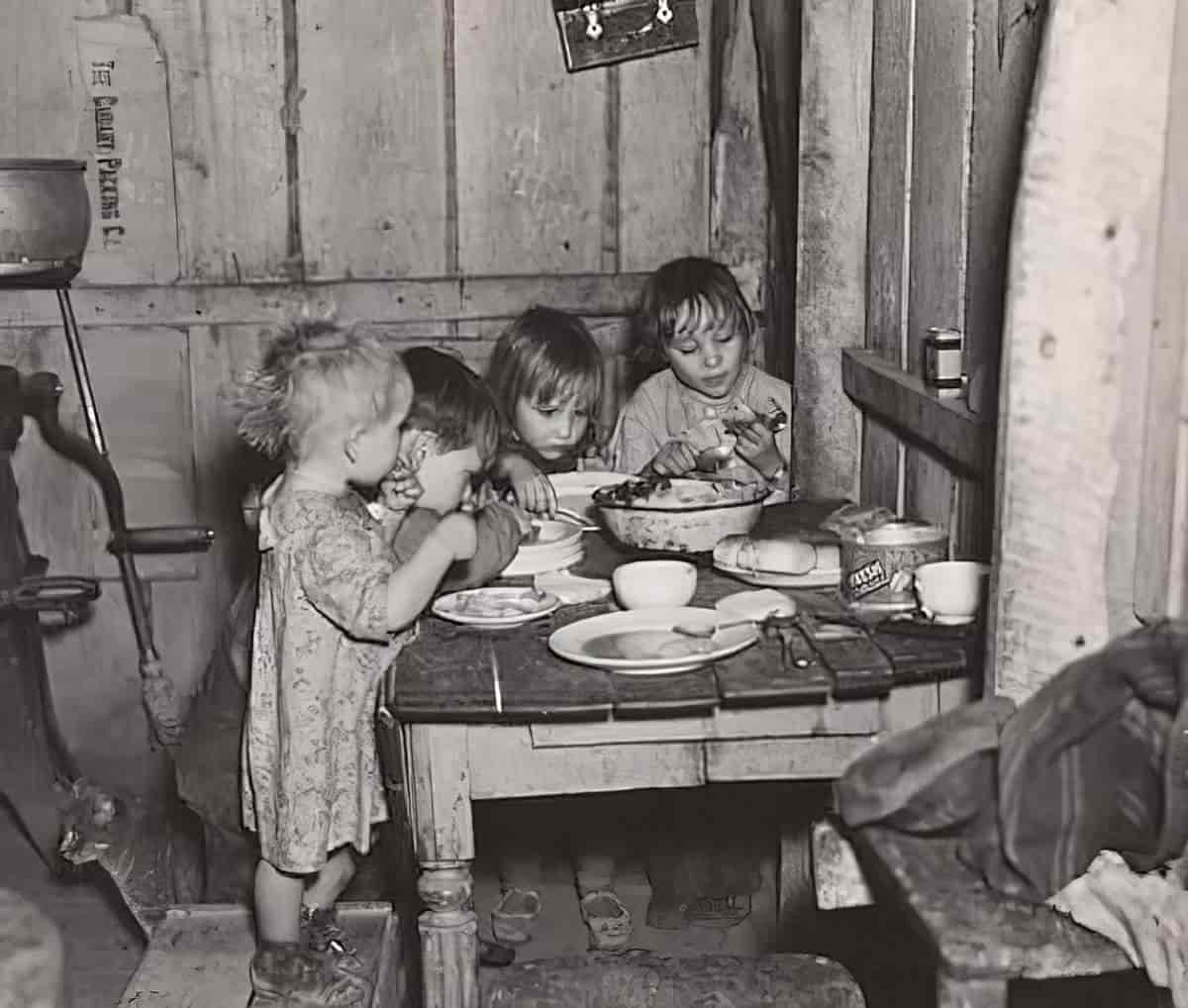
THE TRADITION OF DOOR-TO-DOOR CHRISTMAS CAROLLING
There is a very old tradition of walking from house to house singing carols and collecting money for charity. The traditional period to sing carols is from St Thomas’s Day (21st December) until Christmas morning.
Why did they go door-to-door? Because, for a while, singing was banned in church.
Why was singing banned, you might ask?
To Cromwell and his fellow Puritans … singing and related Christmas festivities were not only abhorrent but sinful. According to historical sources, they viewed the celebration of Christ’s birth on 25 December as a “popish” and wasteful tradition that derived – with no biblical justification – from the Roman Catholic Church (‘Christ’s Mass’), thus threatening their core Christian beliefs. Nowhere, they argued, had God called upon mankind to celebrate Christ’s nativity in such fashion.
During the Puritans’ rule of England, celebrating on 25 December was forbidden. Singing yuletide songs then was a political act, BBC
WHAT HAPPENS IN “DECK THE HALLS” BY SHIRLEY JACKSON
It’s Christmas Eve. We don’t know exactly what year this is set, but there’s some kind of economic shock going down in America. People are finding it hard to source exactly what they need to celebrate Christmas.
A young mother is pottering round home in the mid-century American suburbs, looking forward to Christmas with her husband and their very young daughter. The toddler is not yet old enough to appreciate gifts but the parents are looking forward to seeing her face.
The bear sits under the beautiful Christmas tree in their living room. The reader can deduce already that the little girl won’t fully appreciate this gift. We are also told that she has many other gifts sent by various friends and family, and that these parents have been privileged their entire lives. Jackson sets all of this up very succinctly.
There’s a knock on the door. Two little girls. Sisters. Mrs Williams doesn’t recognise them. They could be neighbours.
They’ve come with a note. A begging note, basically. The mother wonders if Mrs Williams might buy her daughters some basic necessities for the coming year, but if she can’t, that’s okay too. Merry Christmas regardless.
During the Great Depression — or in any economic downturn — people who remain employed have a vastly different experience from households with no workers. At the height of America’s Depression in 1933, 24.9% of the nation’s total work force were unemployed, which meant most people still had jobs. Those households were fine. For those people there was a moral dilemma: What to do about the poverty all around us?
The moral dilemma is meaty in this story. Moral dilemmas always make for good storytelling. If each option is as bad as the other, all the better.
Mrs Williams invites the sisters inside, out of the snow. She needs time to think about what to do. What would be the appropriate action here? She makes the girls cocoa.
The husband has been helping decorate the tree. He entertains the two girls, but ultimately, Mrs Williams is alone in her decision regarding what to do for them. Jackson’s narration focalises on the wife. Should she give money so these stranger-girls can have new school clothes and shoes?
Mrs Williams decides instead to donate clothing from her own wardrobe. She selects items she clearly doesn’t need, including a bathrobe. In a note, she suggests their mother repurpose the clothes somehow, assuming the mother has the time, equipment and skills to do such a thing.

As the girls go to leave, Mr Williams gives the girls $5. Adjusting for inflation, that’s about $60-$80 today, depending on when this is set. That’s enough to buy a decent pair of school shoes today, but shoes were proportionately more expensive. The Williams haven’t given these girls what they need, though we can deduce it wouldn’t hurt the Williams any if they gave $50.
Will the small gift of cash, The Williams feel they have done their duty. “Tell your mother that’s for a Christmas present for all of you,” he says, surely understanding the value of money. For Mr Williams, $5 is literally worth more (in his imagination) when spent by people with much less than himself.
Still, the younger of the two sisters starts to cry as they leave. The older sister explains the reason: She has noticed the big teddy bear, and has always wanted one just like it. The new moral dilemma: Is it appropriate to give charity when it’s not needed, simply wanted? And what is the difference between want and need? Do girls need toys? Even if children need toys for developmental purposes, do they require the most luxurious toys?
Mrs Williams will give the little girl something, but not what the little girl wants.
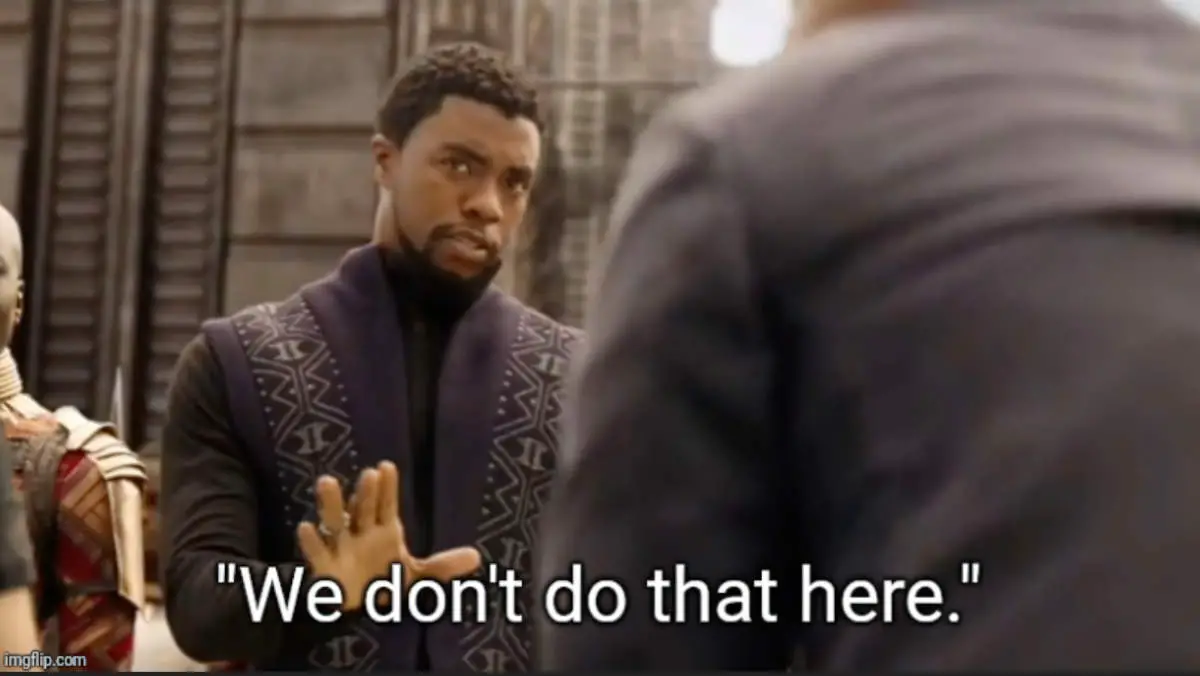
She won’t miss them much, these knick-knacks off the Christmas tree, though it did ‘spoil the balance’ without those extra decorations in place.
Take note of that word ‘balanced’. Mrs Williams is busy doing some moral accounting. Shirley Jackson keeps the moral accounting off the page, but we can see the character’s thought process by her actions.
Before they depart, the older sister remembers to sing a Christmas carol for Mrs Williams on the doorstep. The reader can deduce that they were probably sent over to sing a carol, ostensibly in exchange for any charity. They accidentally skipped that part, and can’t go home without having fulfilled their mother’s instructions. To perform is to offer a service, legitimising the ‘begging’. They sing “Deck the Halls”, but without gusto. They depart sadly.
Readers are left to think about what we would do if we were in Mrs Williams’ situation.

THE NATURE OF CHARITY
Charity ain’t giving people what you wants to give, it’s giving people what they need to get.
Hogfather, Terry Pratchett
The rich rarely have the first clue about what real poverty looks and feels like — the grinding, ever-stressful nature of it. Instead, wealthy people protect themselves with thoughts such as:
- I’ll never be truly hungry. If it comes down to it, I’ll eat beans and brown rice. You can fill your belly on that, and actually, beans and brown rice are quite healthy. My health would probably even thank me for it.
- I’ll grow my own vegetables and fruit trees. By my own labour, I’ll never be truly hungry.
- I’ll never be truly cold. If it comes down to it, I’ll buy clothing secondhand and repurpose using my sewing skills.
- I’ll never be truly without shelter. I’ll live with my mother/father/sibling/aunt. I’ll camp in my 100 thousand dollar campervan we purchased for holidays. It will feel just like a holiday.
It is far more difficult for life-long wealthy individuals to imagine:
- Not having any food at all
- Not having the land to grow food
- Not having money to pay for the electricity to cook, let alone the kitchen equipment to prepare it
- Not having equally wealthy relatives as a financial backstop
- Not having the skills to live on the cheap
- Not having an hour or two to oneself, due to holding down two or three jobs on opposite sides of the city.
The Williams are unable to imagine poverty and are thereby able to justify not giving the girls what they need, let alone what they want. Other conservative ideas which influence charity:
- If we give too much, the children will learn to rely permanently on charity. They’ll never learn to fend for themselves and will be dependent on others their whole lives.
- They are only in this position because of laziness. They may be children, but their parents must be lazy. If we give these children what they want, they will turn out lazy like their parents.
- Many people who ask for charity don’t really need it. Who’s to say they don’t have a perfectly good set of shoes and school clothes already at home? For all I know, they make a killing going door-to-door, selling off the proceeds for their scammer parents.

- If I give to these people, I have less myself. Besides, looking after my own kith and kin is an act of charity in its own right. I have my own little girl to look after. I can’t be looking after everyone else’s.
- If I give something to these girls, I’ll get every homeless child on my doorstep.
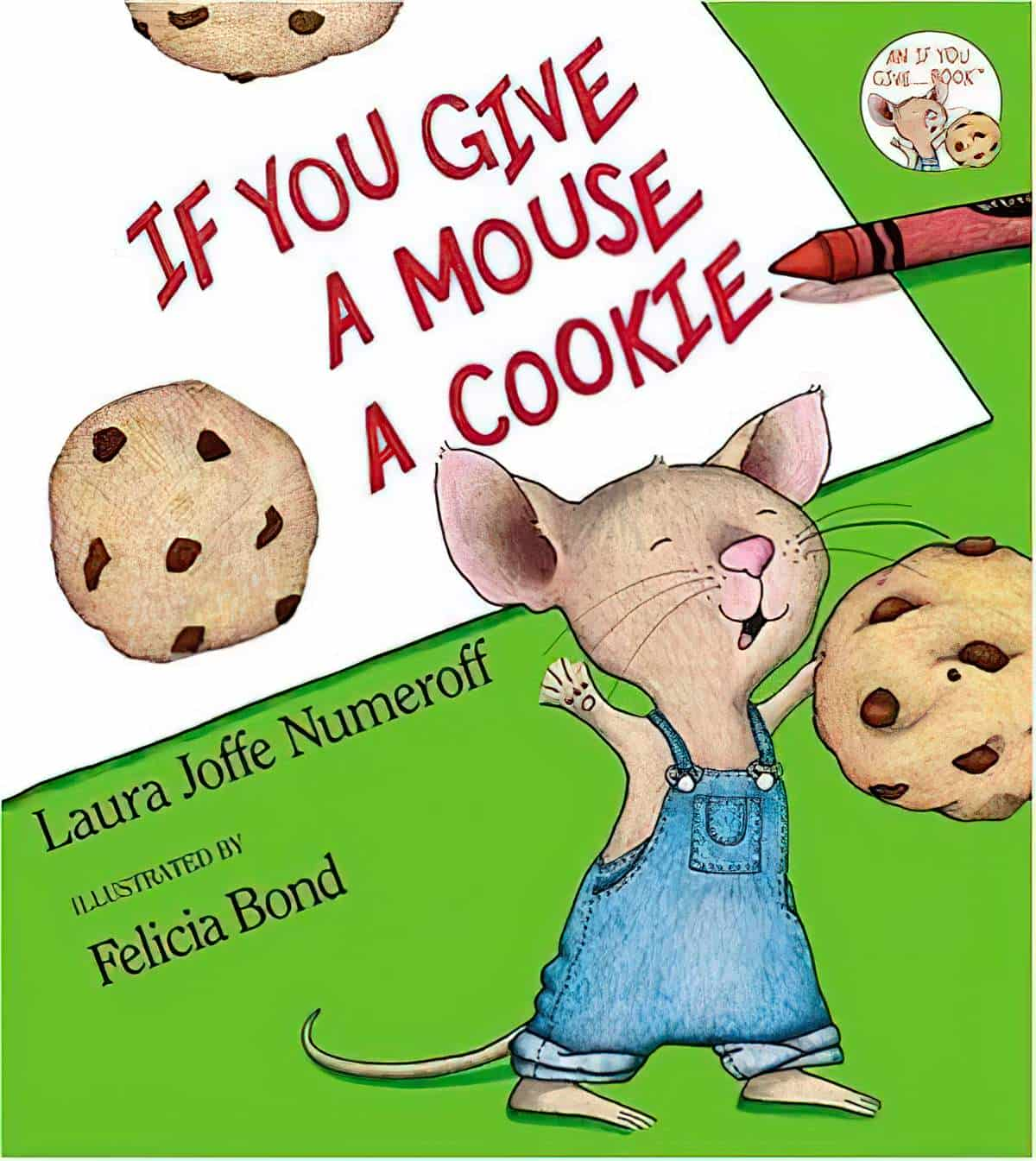
“If You Give A Mouse A Cookie” was chosen for America’s Reading Rainbow series.
Basically, a mouse keeps getting favours, expecting more and more each time. This cute picture book has proven hugely divisive: Does it have a conservative political message regarding how charity works, or is it just a picture book?
My take: There’s no such thing as just a picture book. And it doesn’t matter whether messages are intended by content creators or not. It’s all in how they’re received in the culture where they are read.
Designing for the poor begins and ends with focus on cost. Every detail must be designed to be no more expensive than necessary, and no efficiency is too small not to seize.
Change by Design, Tim Brown
So much power & violence works through exhaustion: the exhaustion of people’s capacities to resist; the exhaustion of people’s capacities to live their lives on their own terms; the exhaustion of having to navigate systems that are designed to make it harder to get what you need.
@SaraNAhmed
It’s so hideous how we treat people who need assistance. Like if they aren’t literally eating only bread and drinking only water we view them as lazy sponges and it is so horrifying to me.
I’d rather one person “cheat the system” than NOT have a system that provides literal life saving food for so many others.
@Heretical_Ramza
Some folks don’t want to believe you’re really poor unless you’re dressed in cardboard. And they cling quaintly to the erroneous belief that they aren’t one rough break away from being in the same spot. ThOsE pEoPlE mUsT bE lAzY
@fightsandflows
I’ve worked for several elected officials over the years and “angry person calling because they were in line behind someone buying something nice with public assistance $$$” is remarkably (and sadly) common.
@davidpdxer
People hate being reminded that they are privileged, especially during the holidays. We prefer to see ourselves as under privileged and feel sorry for ourselves so when someone has it worse, some are very bothered by it. I think?
@67anomica
People in this country, of all wealth statuses, love to act like if you’re poor there shouldn’t be any joy in your life at all, ever. It’s like they think if you have fun while being poor you can’t be motivated to work harder.
@_quillmonger
I used to be a front end supervisor at Whole Foods. Some people are so generous and pay for someone’s groceries or help a stranger who’s short on $. But a lot of people are truly ugly and if they complained I would say “Everyone deserves food.” And they’d get so p*ssed off.
@bereesiekat
Giving to charity can be an empty gesture.
When donating food items:
- Check the use by date
- Donate the best quality you can give, and give it with love
- Include ‘unnecessary items’ such as chocolate, sweets, sugar, chips, nuts, beef jerky, popcorn
- If money is tight, give something small you can afford
Avoid giving cans of chick peas. Given the proliferation of chick peas donated to food banks, chick peas must represent everything that is idealised but not ideal. We know they are shelf stable, a cheap source of protein and also vegan. Rich people imagine that if they became poor, they would still be okay, because they could simply eat chick peas, perhaps mixed with rice. No need to starve. The reality of cooking with chick peas is different: Chefs who work with chick peas require various other ingredients before chick peas taste any good.
CAN WE REALLY IMAGINE WHAT IT’S LIKE TO BE POOR?
It’s super tempting to want to think that in addition to success being justified, suffering is also justified somehow. And I think it’s almost unbearably painful to us to face unjustified suffering. As much as we say — this is the case of the young person who dies, right? As much as we might say, oh, life’s not fair, bad stuff happens, that’s just words. We don’t accept that. On a deep level, we don’t accept that that’s possible.
Status Games, Polyamory and the Merits of Meritocracy (transcript to the podcast)
COMPARE AND CONTRAST
Shirley Jackson’s “Deck the Halls” is highly reminiscent of “A Cup of Tea” by Katherine Mansfield written earlier in the century.
Rather than give a young woman what she needs (money), the wealthy main character of “A Cup of Tea” takes her home and gives her a cup of tea. In both stories, focalisation is on the women.
Ultimately, the privileged housewives are alone, unable to reconcile their own wealth as they live side-by-side with deprivation.
CHRISTMAS CAROLLERS IN ART AND ILLUSTRATION
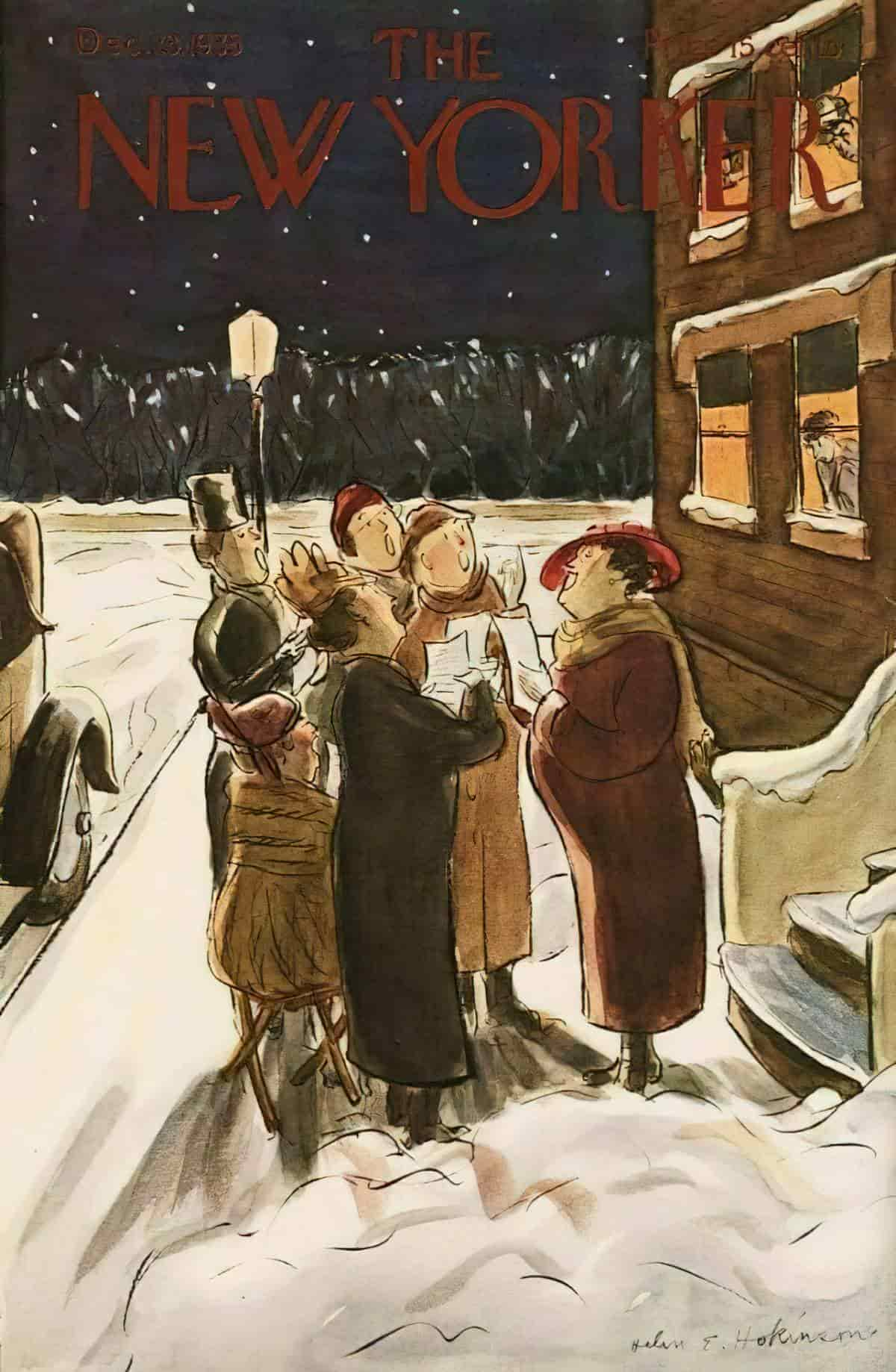
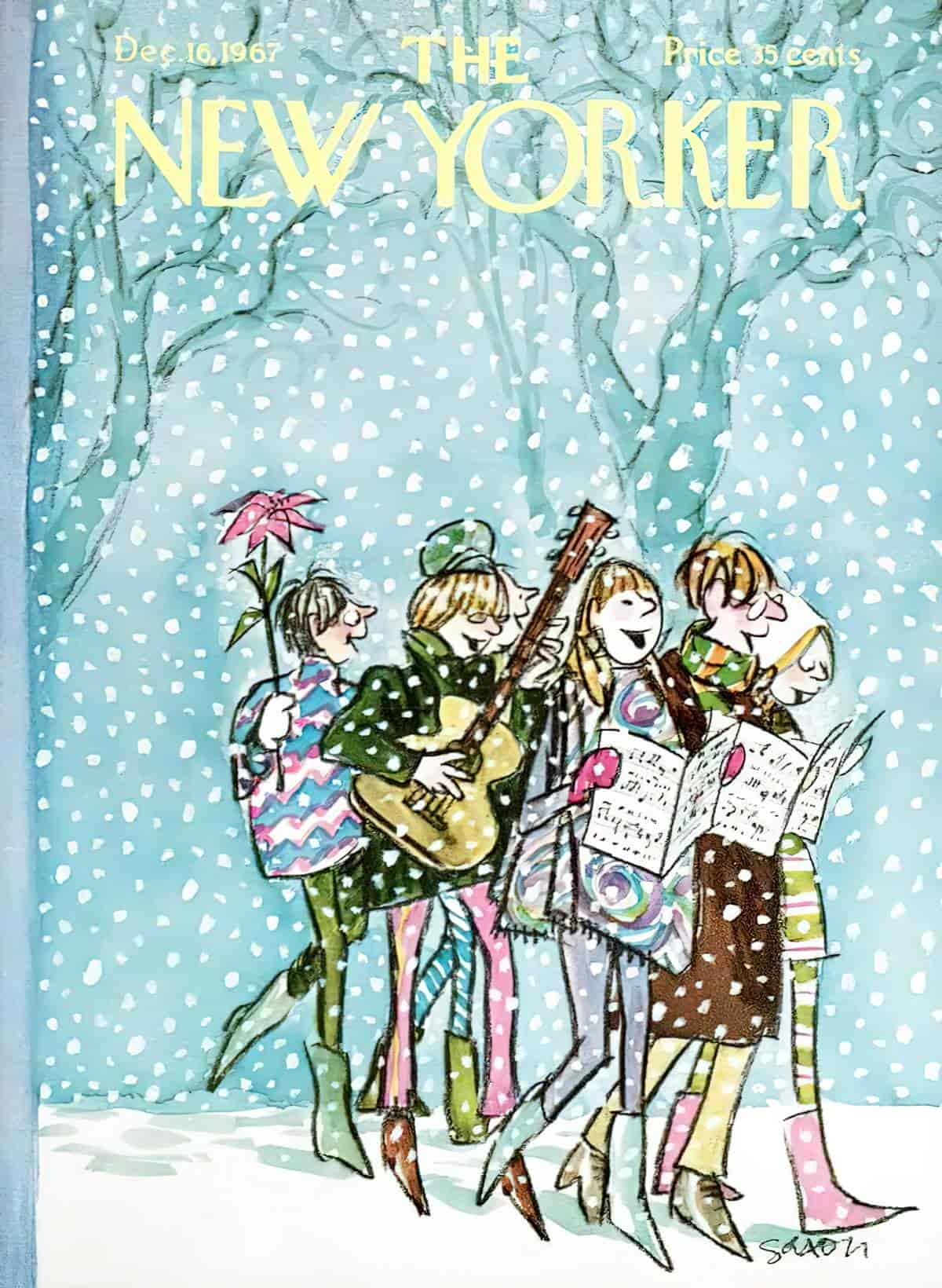
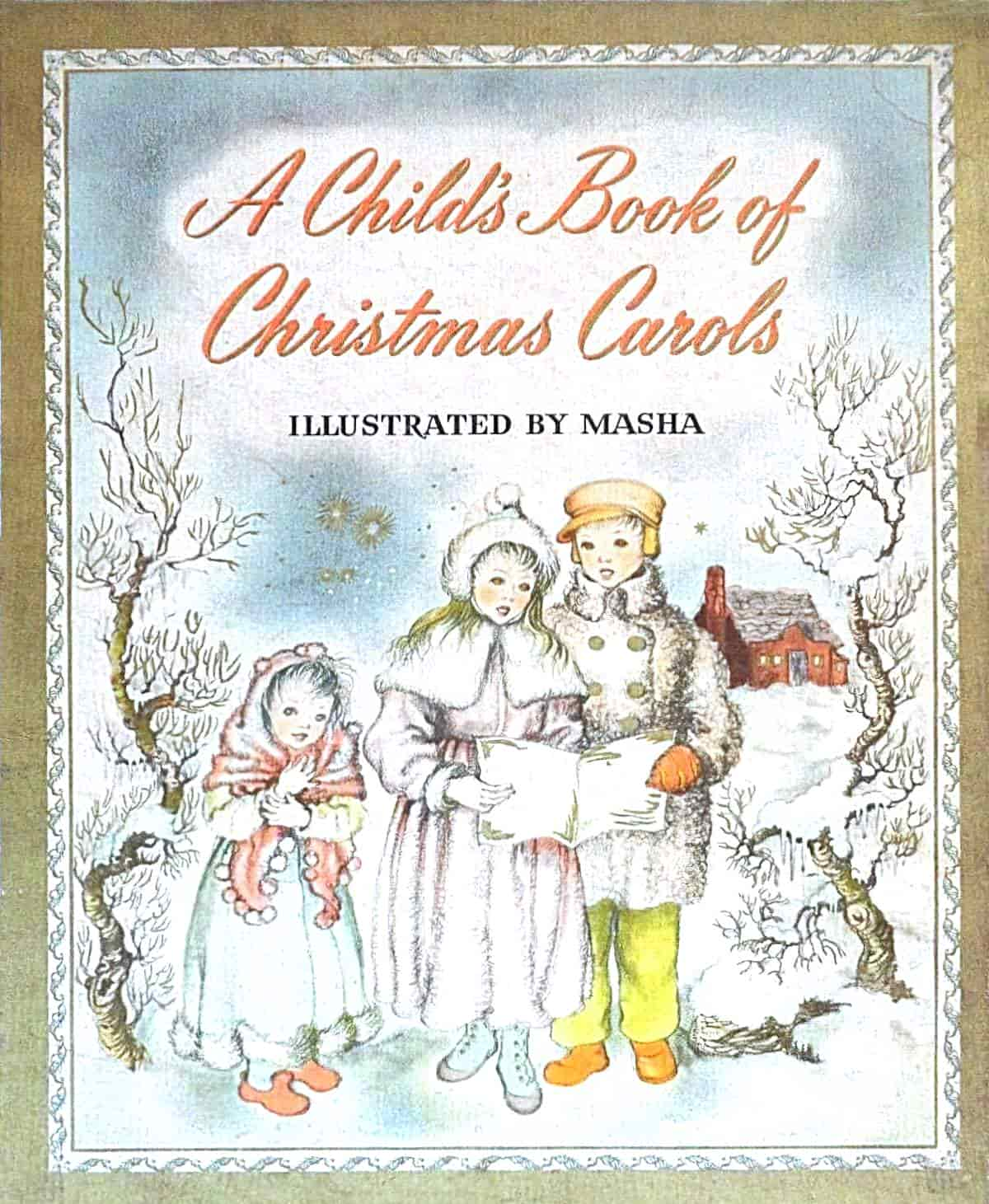
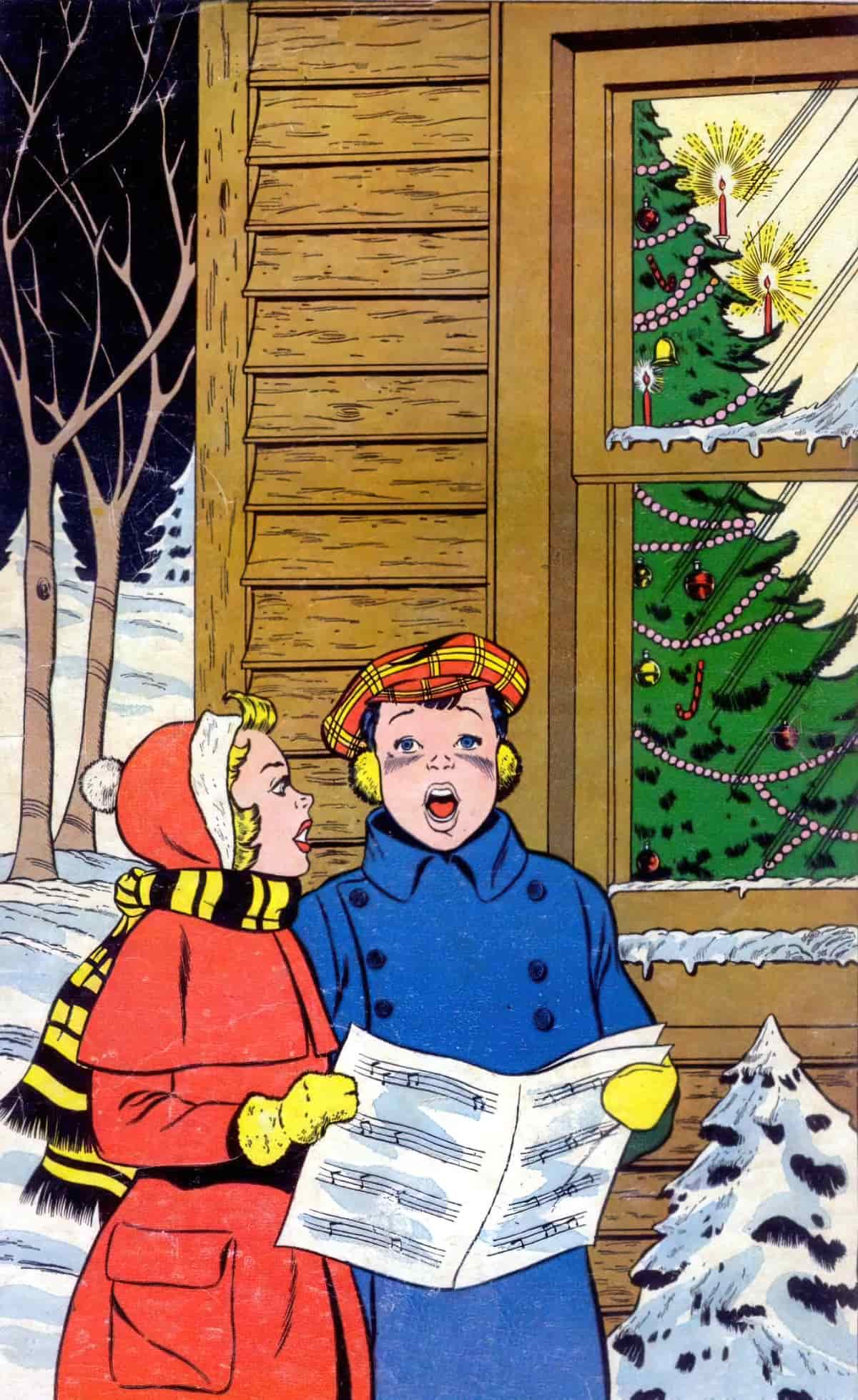
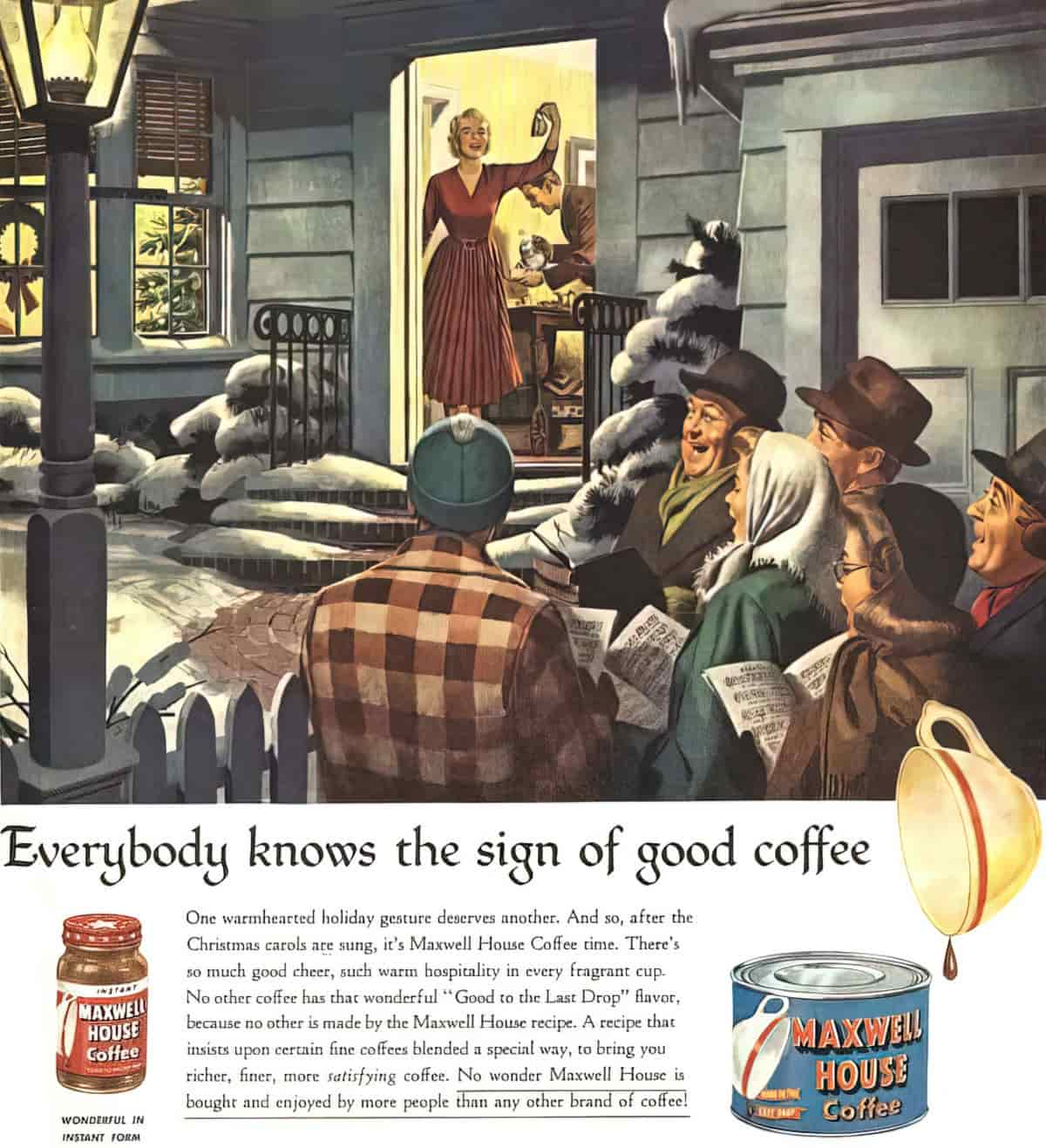
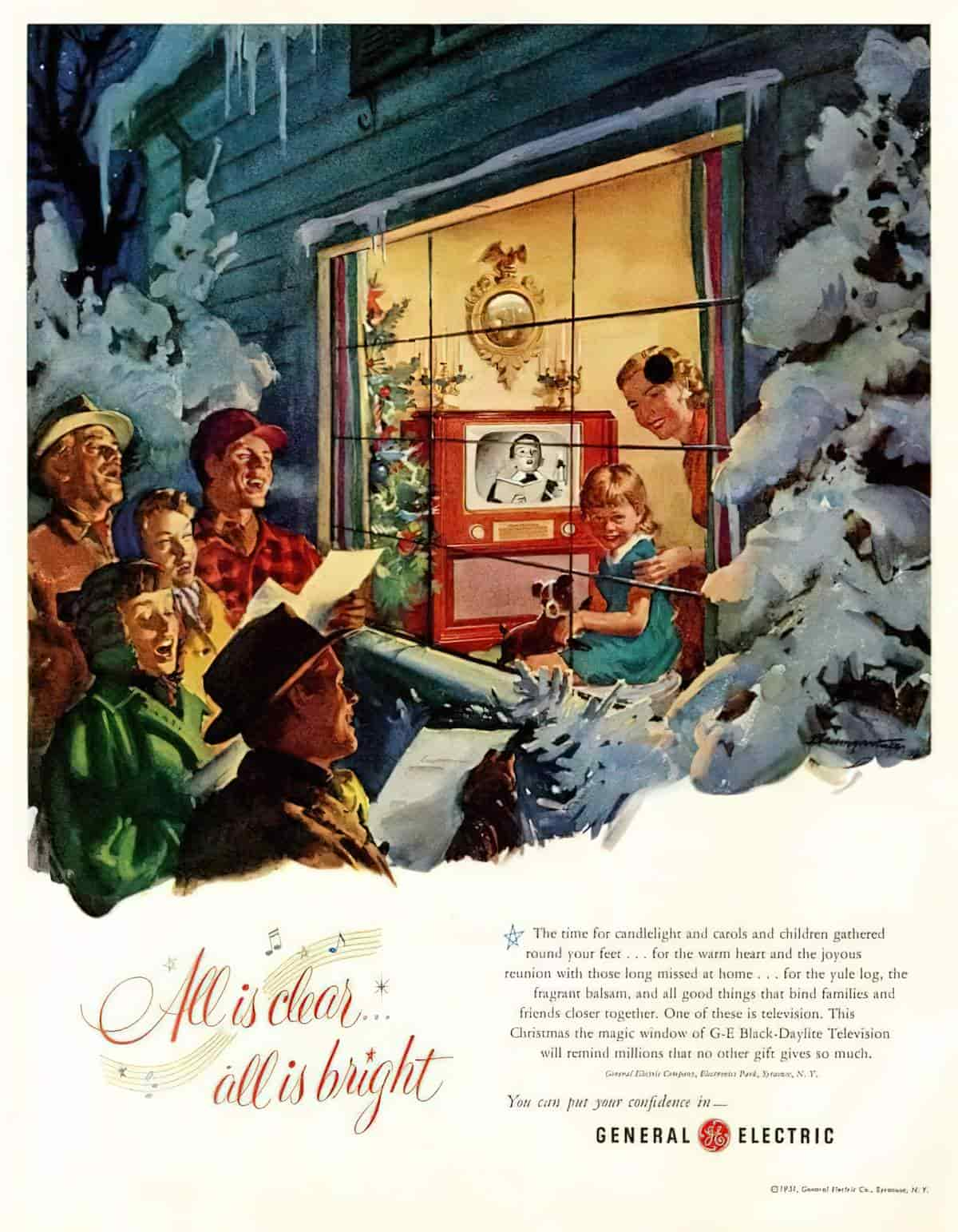
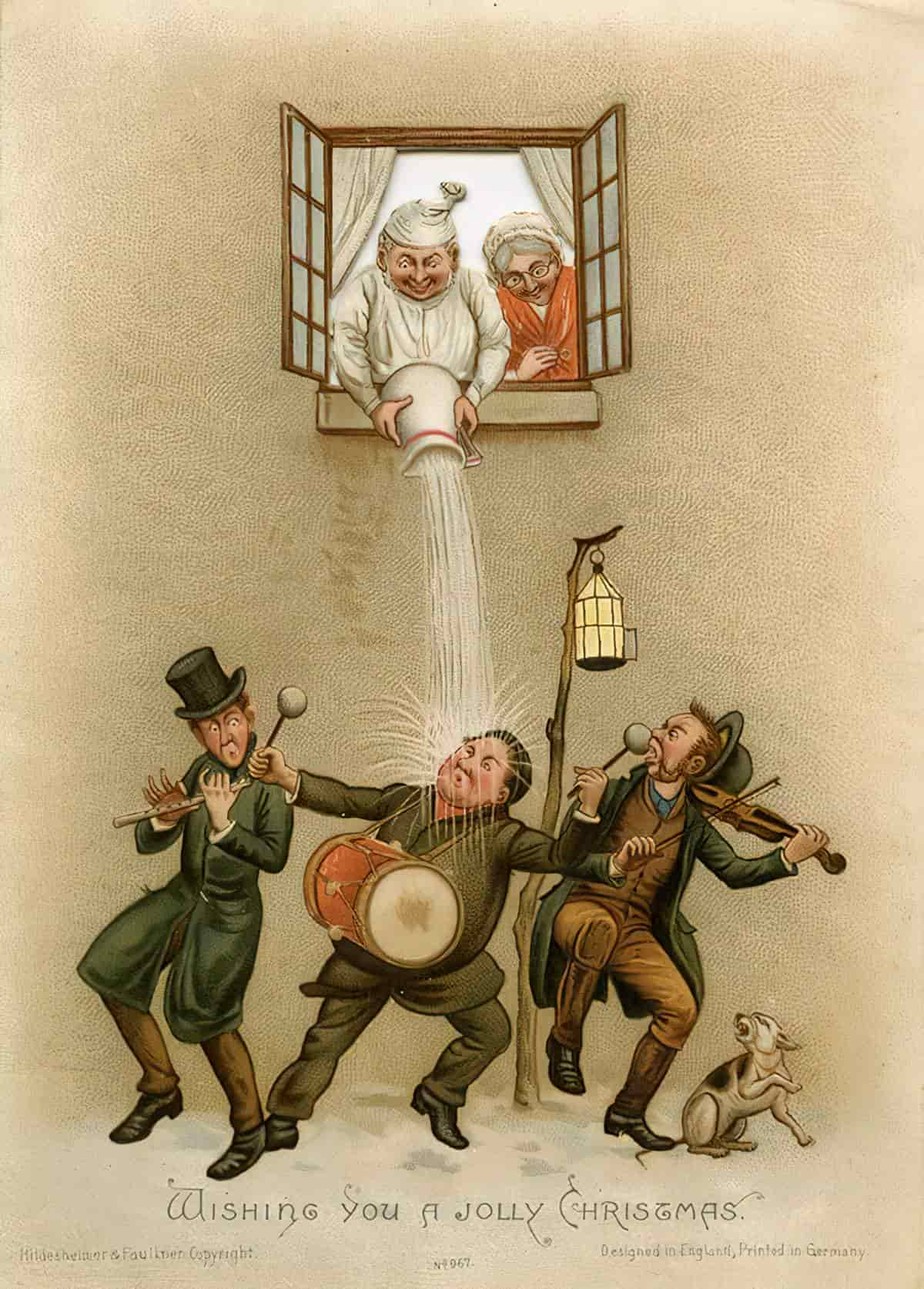
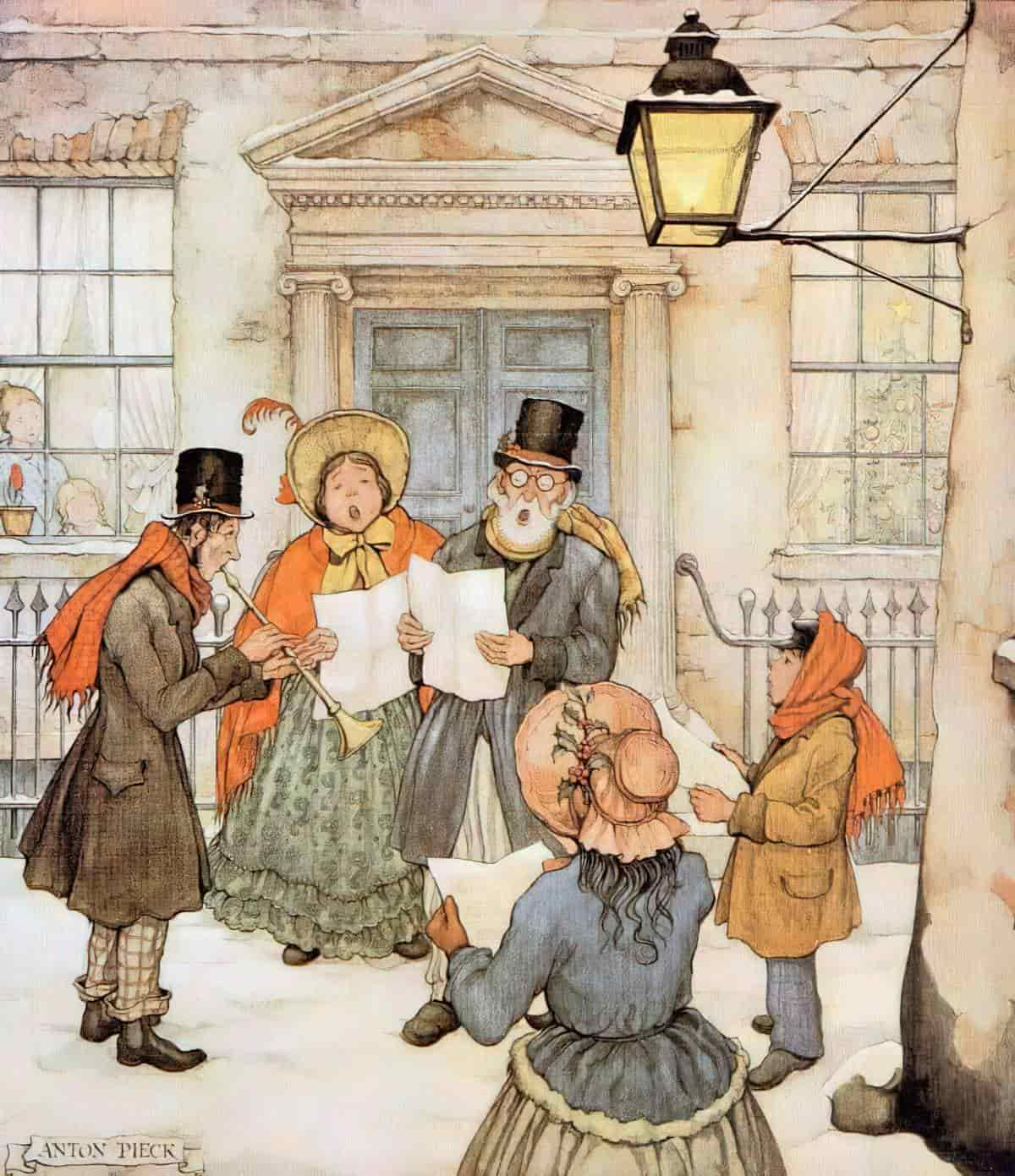
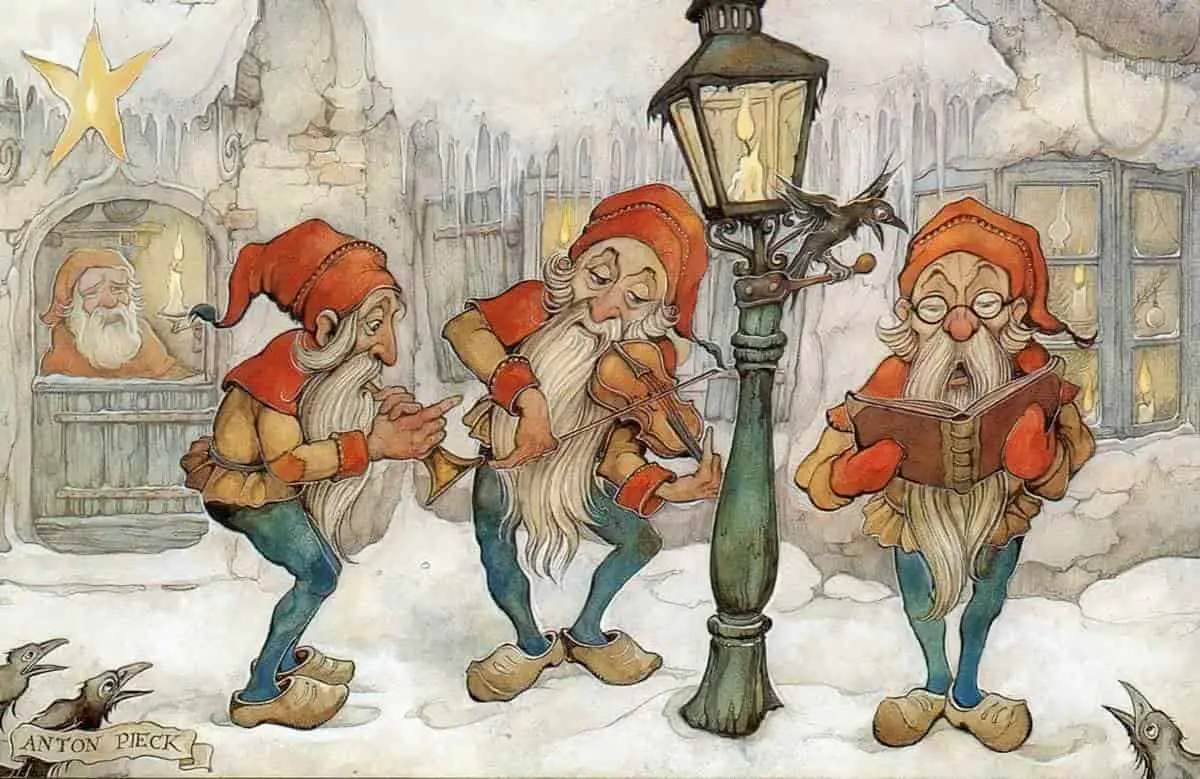
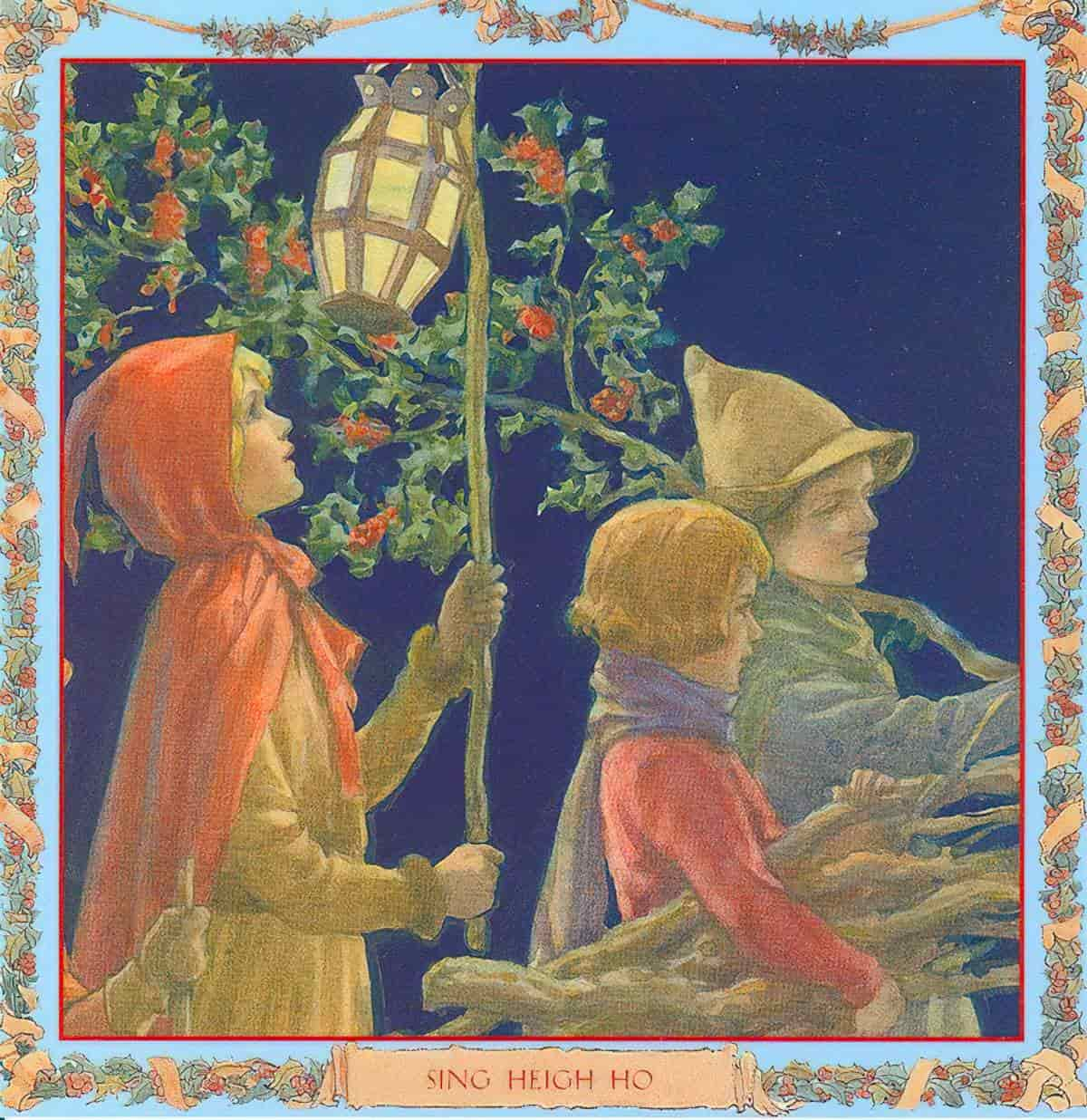
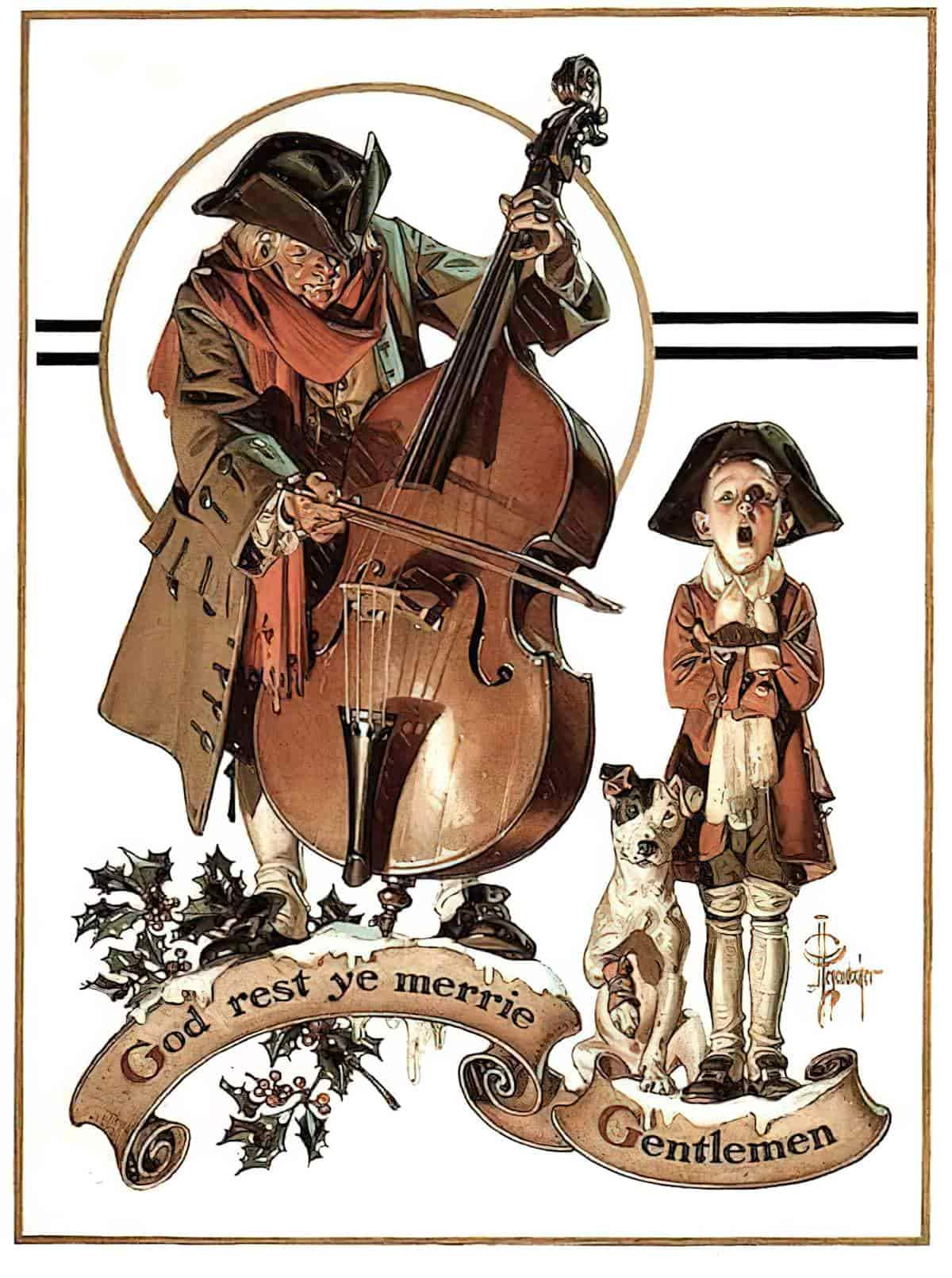
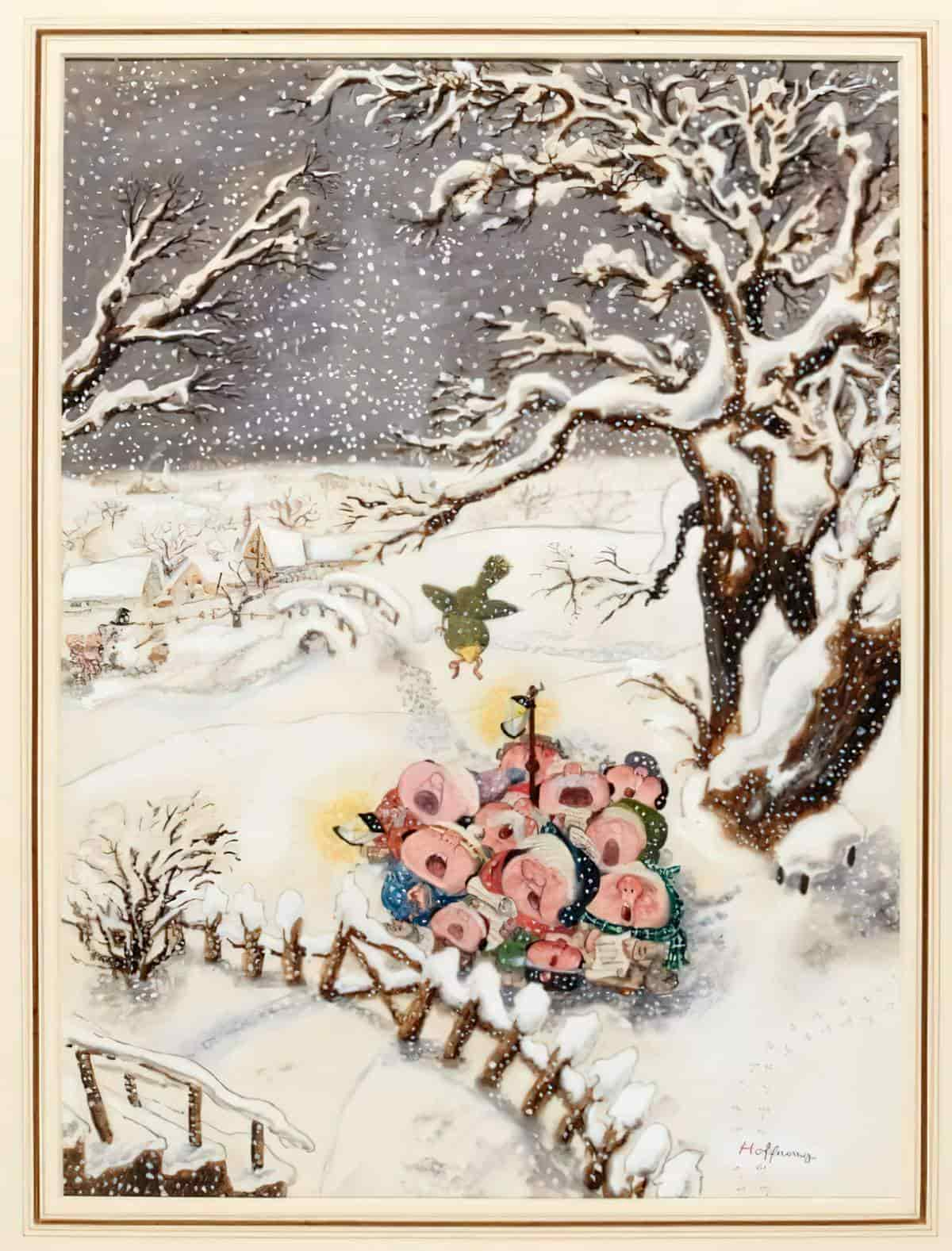
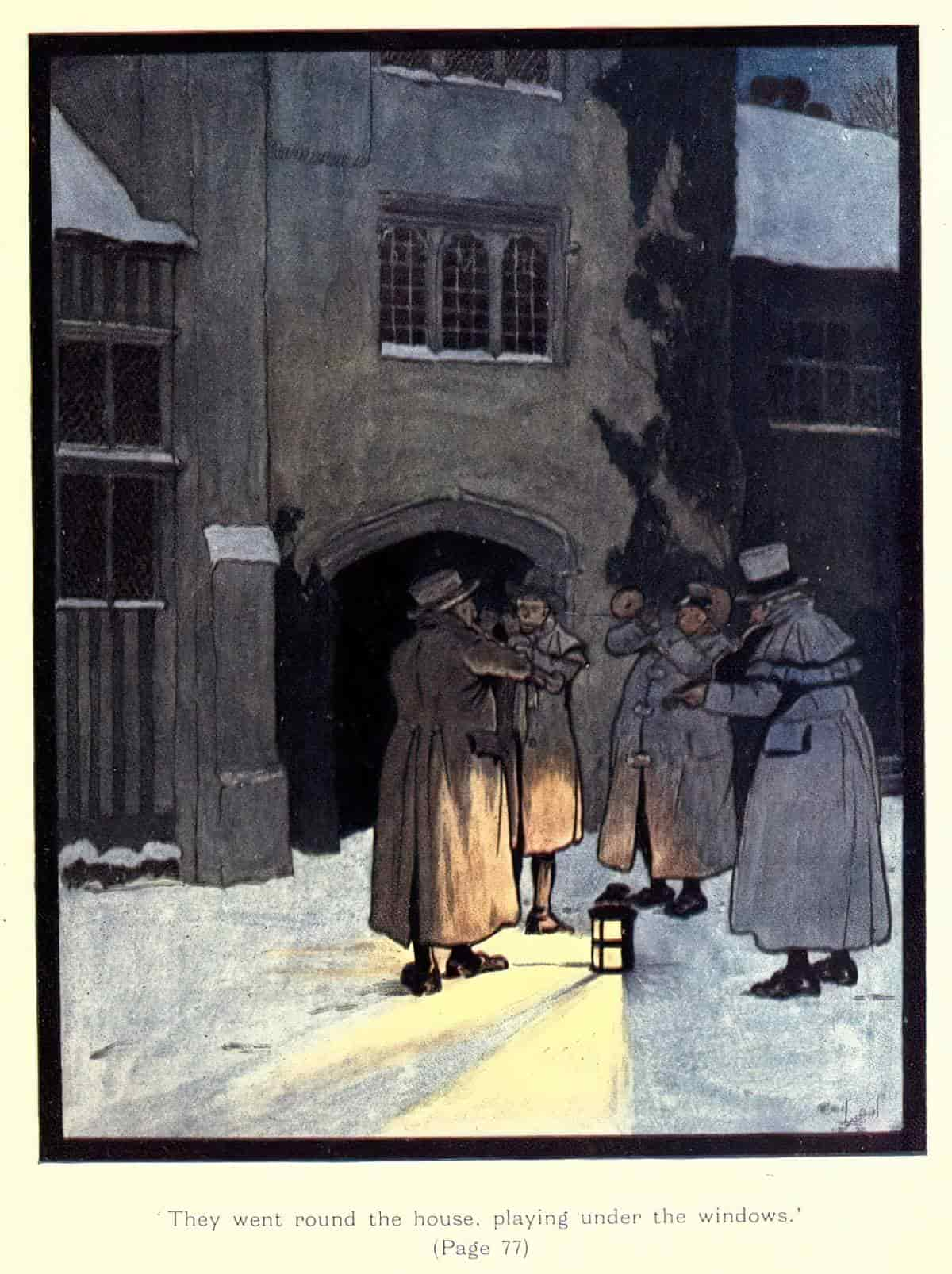
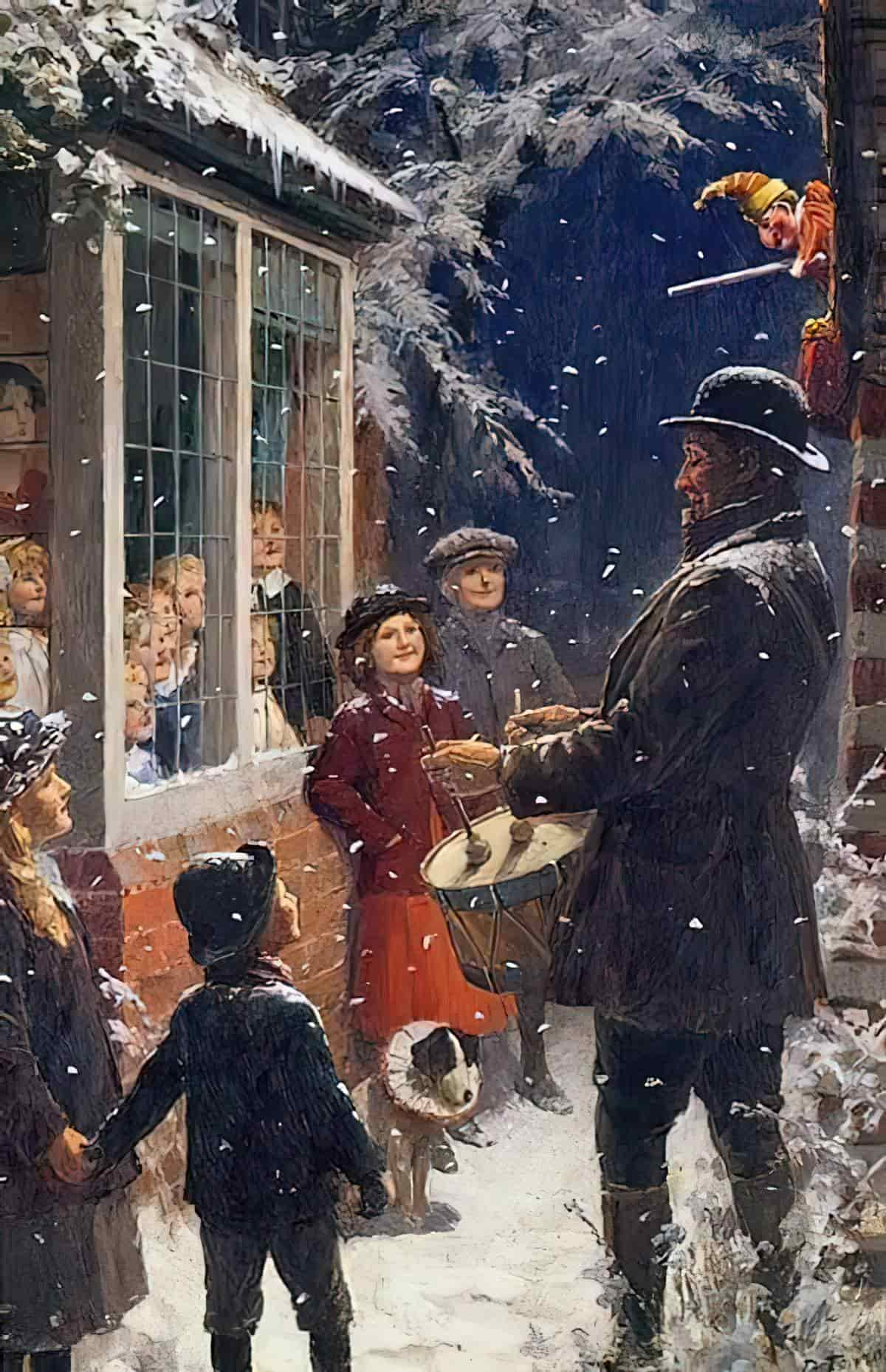
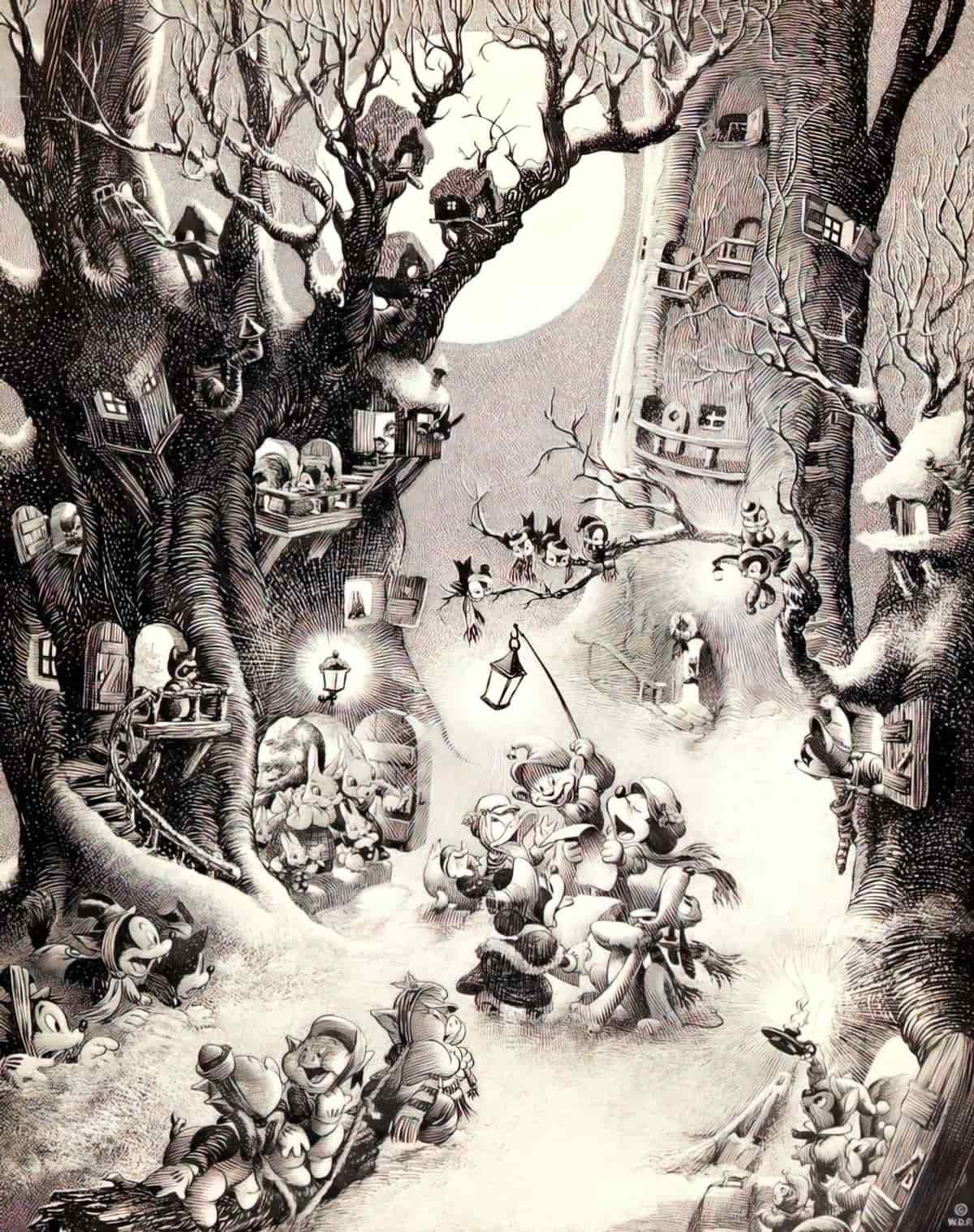
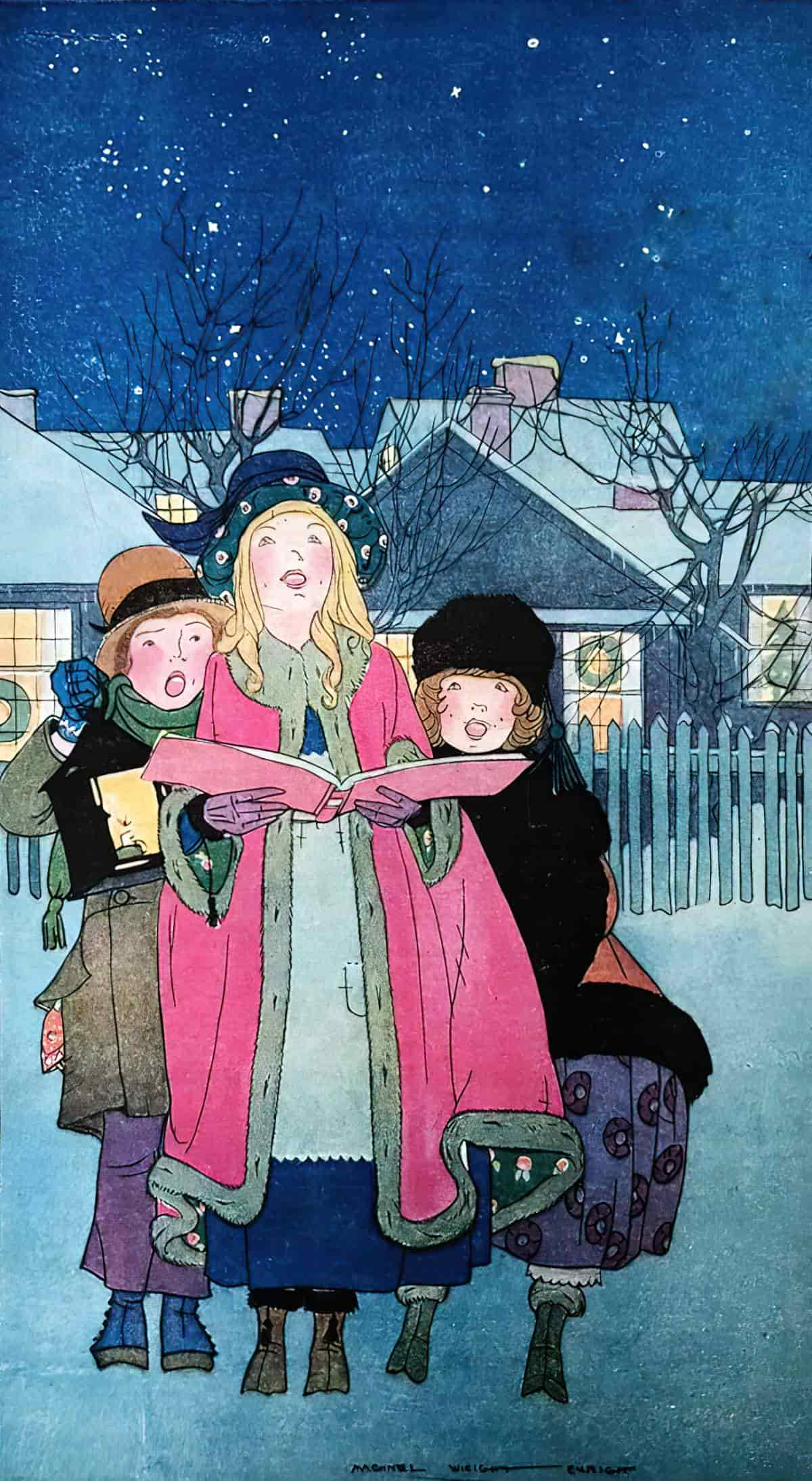
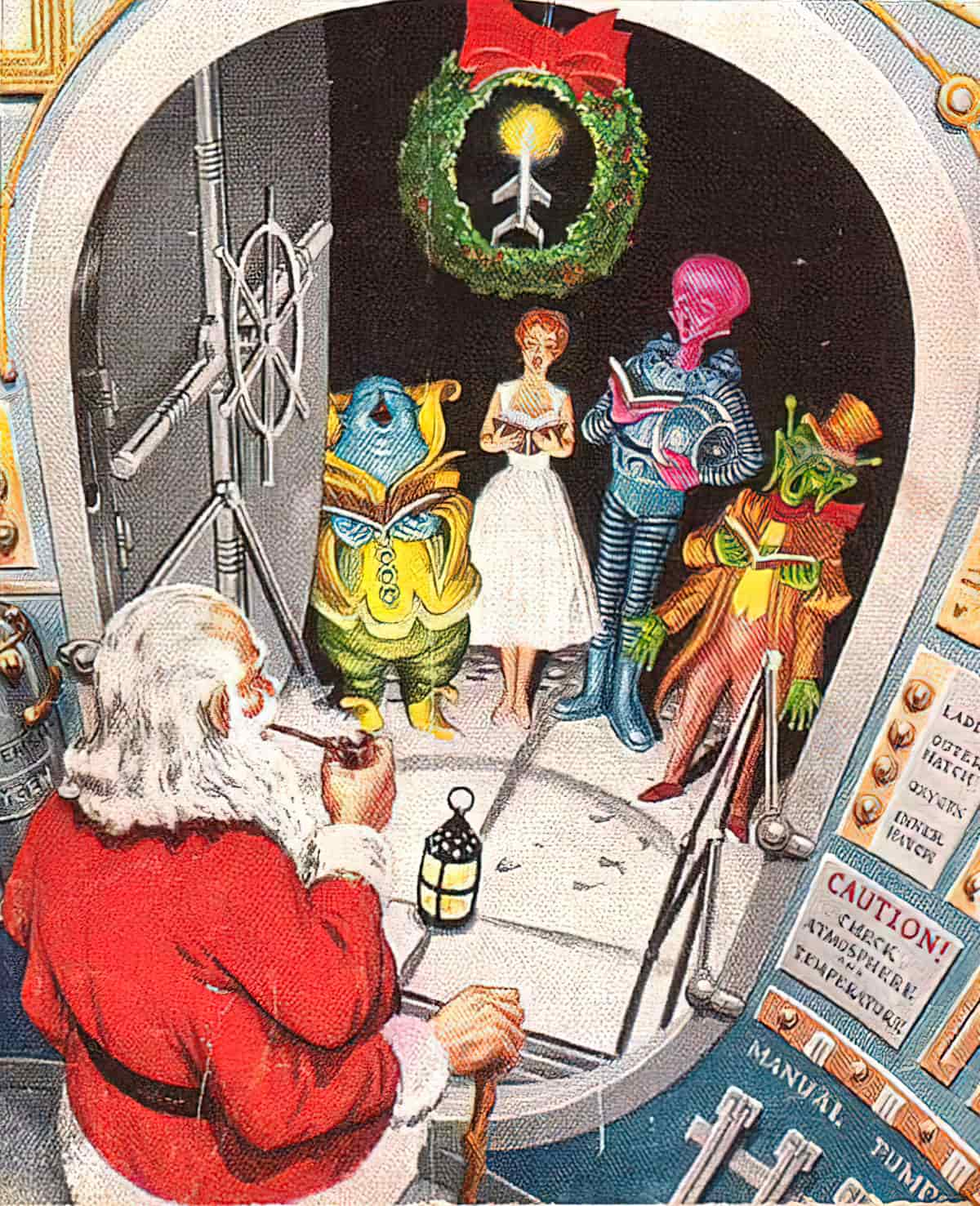
For some children’s books featuring carol singing see:
- The Wind In The Willows by Kenneth Grahame
- Bertie’s Escapade also by Kenneth Grahame
